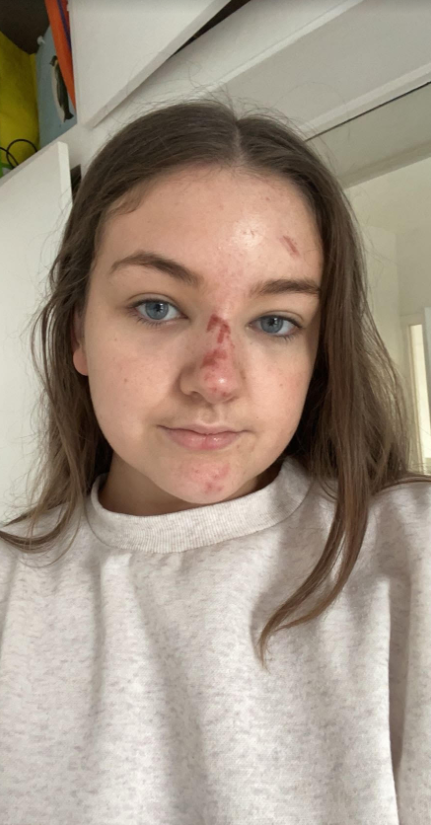Four fifths of drink spiking victims are university students according to shocking new police data.
The statistics revealed 81% of recorded victims were students, while a survey by university news site, The Tab, showed 11% of students believed they had been spiked.
Victims of the crime say it has affected their ability to socialise and their time at university.
Emeli Hanson, 22, who was spiked in her first year at the University of Bristol, said: “I just felt violated. The fact that something’s inside of your body as well that you haven’t chosen to be there just makes you feel completely out of control over something that’s entirely yours.”
A survey by the Alcohol Education Trust suggested more than 1 in 10 students have been victims of spiking.
The offence isn’t just happening in bars and clubs, it can also occur in ‘more secure’ environments. Emeli, from Lincolnshire, was spiked during a house party in October 2021 during her second year at Bristol University, where she was studying Politics and Philosophy.
The last thing Emeli remembers is leaving the party with a friend who explained when she got to their house, “her eyes rolled into the back of her head and she was vomiting up a black substance”.
Emeli, who was taken to A&E by her friends, said: “Once I came around, I couldn’t feel anything past my hips and in the lower half of my body, which is obviously extremely scary.
“I couldn’t use my bladder or wee because that was causing extreme pain. They ended up having to catheterise me to get fluid out because they were worried about my bladder bursting.”
Spiking can cause confusion, nausea, vomiting, disorientation and memory loss, but the psychological symptoms can often outweigh the physical symptoms.
Emeli, who is currently studying International Development at the University of Sheffield, said: “It was before the outbreak of spiking at UK universities, so they weren’t testing for it in the hospital.
“I won’t ever know what substance was inside my body which took a lot of coming around to. That’s something that I had to let go of, where I was already in a situation where I already didn’t have control.”
“At night, as a woman, the certain vulnerabilities that I feel and the fact that it felt like somebody had taken advantage of that made that feeling worse.
“I’m now extra cautious when I go out. I’m aware of the people around me, I constantly have a hand over my drink, I don’t accept drinks from people and constantly think that someone has an ulterior motive.
“I felt so angry that I went on a night out at university to have fun and then something happened to me that is probably always going to have some impact on me.”
Shannon O’Rourke, 23, from London, was spiked not long before she started University of Lincoln and said it heavily affected her experience as a student.

She had met up with friends in a Wetherspoons pub in London, but very quickly lost control of her limbs and could not walk. Shannon, had ordered her second drink from the venue app. After finishing it, she went to the toilet and doesn’t remember anything after leaving the bathroom.
“The next thing I remember was waking up in a dark room in a hospital bed,” said Shannon. “I had to go on Google Maps to find out where I was. I had no idea where my friends were or if anyone I knew had been contacted.
“I was completely unaware of everything that was going on. I was only 19. It was terrifying. I don’t remember anything after leaving the toilet.
“I woke up to bruises and cuts everywhere. I needed to have a CT scan on my nose to make sure it wasn’t broken.”

A few months later Shannon, who is now studying for her PGSE, started university during the The COVID pandemic. She said: “It actually made life a lot easier for me because I didn’t have that nervous feeling of going out and someone else being near my drink. I could keep my alcohol to myself and keep myself to myself – I knew exactly how much I was having and what I was having.”
During her second year of university, Shannon began struggling with going out and drinking. She said: “I did get quite nervous. I didn’t really drink in my second year. It definitely threw me slightly – there was also a big hit of spiking at that time.
“Going on nights out and drinking is a massive part of university and if you have one bad experience, it can throw you completely.
“If that can happen in a pub, what can happen in a nightclub or bars that I’m not familiar with or people I’m not comfortable with yet?”
The Department for Education and Home Office released a statement in May 2022 expressing their dedication to tackling the number of spiking incidents that students face.
Universities Minister Michelle Donelan said: “This is an issue that is very close to my heart, having had someone close to me spiked when I was younger, which had devastating consequences. So I know first-hand what a horrific crime this is and I am determined to stamp it out.”
Some universities have already set up their own initiatives to stop spiking. Nottingham Trent University is funding and delivering bystander intervention training to staff in the night-time economy. The University of Exeter is also offering drink safety test strips.
As well as a call to action for universities to prevent spiking, there is also encouragement for victims to come forward and report if they’ve been spiked. According to Stamp Out Spiking’s national survey, over 97% of victims don’t report being spiked to the police.
If you’ve been affected by spiking, you can report it online, by calling 101, or by visiting a police station. Click here for more information.




